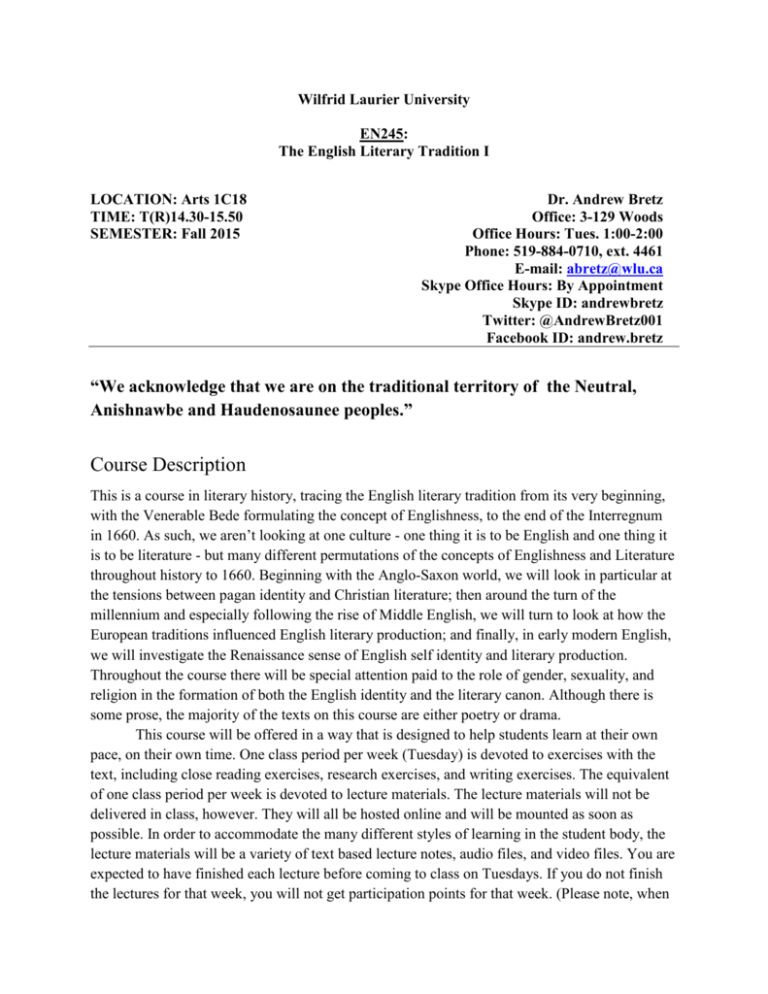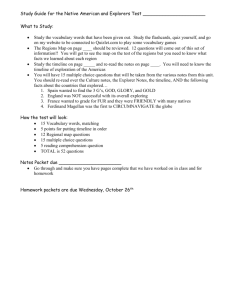Course Description - WLU - Wilfrid Laurier University
advertisement

Wilfrid Laurier University EN245: The English Literary Tradition I LOCATION: Arts 1C18 TIME: T(R)14.30-15.50 SEMESTER: Fall 2015 Dr. Andrew Bretz Office: 3-129 Woods Office Hours: Tues. 1:00-2:00 Phone: 519-884-0710, ext. 4461 E-mail: abretz@wlu.ca Skype Office Hours: By Appointment Skype ID: andrewbretz Twitter: @AndrewBretz001 Facebook ID: andrew.bretz “We acknowledge that we are on the traditional territory of the Neutral, Anishnawbe and Haudenosaunee peoples.” Course Description This is a course in literary history, tracing the English literary tradition from its very beginning, with the Venerable Bede formulating the concept of Englishness, to the end of the Interregnum in 1660. As such, we aren’t looking at one culture - one thing it is to be English and one thing it is to be literature - but many different permutations of the concepts of Englishness and Literature throughout history to 1660. Beginning with the Anglo-Saxon world, we will look in particular at the tensions between pagan identity and Christian literature; then around the turn of the millennium and especially following the rise of Middle English, we will turn to look at how the European traditions influenced English literary production; and finally, in early modern English, we will investigate the Renaissance sense of English self identity and literary production. Throughout the course there will be special attention paid to the role of gender, sexuality, and religion in the formation of both the English identity and the literary canon. Although there is some prose, the majority of the texts on this course are either poetry or drama. This course will be offered in a way that is designed to help students learn at their own pace, on their own time. One class period per week (Tuesday) is devoted to exercises with the text, including close reading exercises, research exercises, and writing exercises. The equivalent of one class period per week is devoted to lecture materials. The lecture materials will not be delivered in class, however. They will all be hosted online and will be mounted as soon as possible. In order to accommodate the many different styles of learning in the student body, the lecture materials will be a variety of text based lecture notes, audio files, and video files. You are expected to have finished each lecture before coming to class on Tuesdays. If you do not finish the lectures for that week, you will not get participation points for that week. (Please note, when you are on My LearningSpace, you are always being tracked. I can see when you’ve read, watched, or listened to the materials. Like AshleyMadison.com, My LearningSpace is far from anonymous.) Please come to class prepared to discuss the text of the week and to investigate the problems that were covered in the lecture materials. For your convenience, in the outline below, class periods that are being replaced by online materials are shaded in grey. Course Objectives By the end of this course, students should be able to: 1. Identify the major the major authors, figures, and events of the medieval and Renaissance periods in England 2. Describe and complicate the definitions of such basic concepts as (though not limited to): a. Literature/Literary b. Canon/Canon formation c. Author/Authorship d. Drama/Poetry/Prose e. Medieval/Renaissance 3. Illustrate the literary history of the medieval and Renaissance periods through the use of a timeline 4. Compose proficient scholarly prose in English at a university level Required Texts: Black, Joseph et al. The Broadview Anthology of British Literature: Concise Volume A (From the Medieval Period to the Eighteenth Century. 2nd Ed. Peterborough, ON: Broadview, 2011. ISBN: 9781554810482 (Please note: This text will come to the university bookstore packaged with Broadview’s Twelfth Night. If you do not wish to get the two packaged together, you are more than welcome to order the anthology on its own and read Twelfth Night separately.) Schedule SEPTEMBER 2015 Sunday 6 Monday 7 Tuesday 8 Wednesday Thursday 9 10 Friday 11 Saturday 12 18 19 14.30-15.50 Arts 1C18 Introduction to Course 13 14 15 16 17 14.30-15.50 Arts 1C18 Bede the Venerable pgs. 36-50 Bede Quiz Available Online 20 21 22 23 24 25 26 14.30-15.50 Arts 1C18 Beowulf pgs. 62-106 Beowulf Quiz Available Online 27 28 29 14.30-15.50 Arts 1C18 Liturgical Drama and Hrotsvitha of Gandersheim Text available online 30 Timeline for Old English/AngloSaxon Due OCTOBER 2015 Sunday Monday Tuesday Wednesday Thursday 1 Friday 2 Saturday 3 Hrotsvitha Quiz Available Online 4 5 6 7 8 9 10 14.30-15.50 Arts 1C18 Wife of Bath's Prologue and Tale pgs. 300-321 Wife of Bath's Prologue and Tale Quiz Available Online 11 12 18 19 13 14 15 16 17 20 21 22 23 24 14.30-15.50 Arts 1C18 Cycle Drama and The Second Shepherds' Play Pgs.402-418 Cycle Drama and The Second Shepherds' Play Quiz Available Online 25 26 27 28 29 30 31 14.30-15.50 Arts 1C18 Everyman Text Available off of Publisher's Website Everyman Quiz Available Online NOVEMBER 2015 Sunday 1 Monday 2 Tuesday 3 Wednesday 4 Thursday 5 Friday 6 Saturday 7 11 12 13 14 14.30-15.50 Arts 1C18 Twelfth Night Additional Text Packaged with Course Text Middle English/High Middle Ages Timeline Due 8 9 10 14.30-15.50 Arts 1C18 Twelfth Night Additional Text Packaged with Course Text Twelfth Night Quiz Available Online 15 16 17 18 19 20 21 14.30-15.50 Arts 1C18 Religious Writing Amelia Lanyer 717-723 George Herbert 867-877 Religious Writing Quiz Available Online 22 23 24 25 26 27 28 14.30-15.50 Arts 1C18 Elizabethan Sonnets 546-554 654-655 791-808 Elizabethan Sonnets Quiz Available Online 29 30 DECEMBER 2015 Sunday Monday Tuesday 1 14.30-15.50 Arts 1C18 Jacobean Sonnets Lady Mary Wroth 851854 John Donne 824, 846849 Wednesday 2 Thursday 3 Friday 4 Saturday 5 Jacobean Sonnets Quiz Available Online 6 7 8 9 10 11 12 14.30-15.50 Arts 1C18 From Coterie to Closet Katherine Phillips 891896 Milton 897, 904-910 Timeline for Early Modern/Renaissance Due Assessments: Timelines: 15% (5%/5%/5%) Quizzes: 45% Participation: 15% Final Exam: 25% Weekly Quizzes (10 Quizzes for a total of 45%) The weekly quizzes will be administered online, off of the course website. They will be approximately 10-15 questions long. They will test your knowledge of the period through multiple choice, matching, and other standard quiz format questions, such as short answer. The quizzes will be available from the end of the day on Thursday (11:59 PM) to the end of the day on Saturday (11:59 PM) each week. There will be no make up quizzes allowed. Questions on the quiz may be cumulative. You may have only one attempt at each quiz. Timelines (5% each for a total of 15%) https://drive.google.com/folderview?id=0Bxuzm3tcySE7fnZzRllQZlgyR2steld1eTJLM3pWUzl oc2RSdWhsbTZ0Nk5FcUpqMF96SlU&usp=sharing In Google Drive, I have created a folder that contains three spreadsheets - “Timeline - Old English”, “Timeline - Middle English”, and “Timeline - Early Modern English”. For this assignment you are expected to add two events to each of the timelines by the time we finish studying that period in the course. Each timeline entry is worth 2.5% of your total grade, resulting in a total of 15% for this assignment. The timeline is, at its most basic, merely a list of dates and events with a rationale for the inclusion of those dates or a description. Those three elements - date, event, description - are essential for every entry in your timeline. Entries are to be chosen according to your own understanding of what is important to understand the period in question. The first timeline will outline the history of the medieval period in England, dominated by Old English (ca. 500CE to ca. 1100CE), the second timeline will outline the history of the medieval period in England, dominated by Middle English language (ca. 1100CE-ca. 1500CE), and the final timeline will cover the Renaissance period in England, dominated by early modern English (roughly ca.1500CE to 1660CE). Each timeline should consist of approximately 50 entries, outlining what students feel to be the most important, influential, and profoundly impactful events or texts from the period. Please see below for example entries. In terms of format, please see the document on the course website regarding this assignment. ● Entries must be created via the google sheets page, which has some unique properties. Don’t delete anyone else’s entry, just supply your own. ● If someone else has written on a given event, you cannot write on it as well. Each entry should be unique both in terms of the content and in terms of the event described. ● Each entry should be factually true, appropriate to the course material or subject covered, and answer the “so what?” question. By that I mean that the text of each entry should provide a clear connection to the course in terms of literary history. Example (Partial) Entry Start Date End Date Headline 2/1/1328 7/17/1453 Text The Hundred The Years War Hundred between Years War France... Media Media Credit https://youtu.be/ LixNElNrJ3c Youtube Author Name Media Thumbnail Type Tag Andrew Bretz In each of the spreadsheets you will see the above columns. Do not delete any column. For this assignment you are expected to fill in: ● The start date for your event in MM/DD/YYYY format ● The end date for your event in MM/DD/YYYY format (If there is one - if the event happened on a single day, please leave this blank) ● Create a title for your entry ● Enter between 70-200 words of Text ● Provide your name under Author Name In addition, you may link media to your entry in the form of audio files, youtube clips, google maps, image files, etc. In each of the timelines are a series of examples that have literally nothing to do with the medieval and early modern worlds, just to give you a sense of what is possible. If you do link media, please fill in the credit function as well. (Credit: Where did you find the media?) The other columns, for the purposes of this assignment, should be empty. For further help, please visit the website of this free timeline generator: http://timeline.knightlab.com/ If you have any questions, please don’t hesitate to ask online or in person. Date Event Description 10 October 1066 The Battle of Hastings The Duke of Normandy, William the Conqueror (William I) invaded England on somewhat dubious pretexts following the death of Edward the Confessor and the subsequent coronation of Harold Godwinson (Harold II). This, the major battle of the campaign, was the last time an Anglo-Saxon monarch of England led troops into battle. With the rise of the Norman kings and their use of Norman French as the court language, Old English began to fall into disuse. Within a few generations, Middle English began to replace the old language of the Anglo-Saxon indigenous population. Middle English combined elements of Old English (inflection, vocabulary, grammar) and imported to it elements of French (vocabulary, new grammatical forms, pronunciation). 5 Sept 1607 Hamlet performed aboard the Red Dragon The crew of the Red Dragon, a ship off the coast of Sierra Leone performed Hamlet. This is the first instance known of a performance of Hamlet, though it had been undoubtedly performed for years in London. The event shows the intercontinental nature of English explorations during the rise of the colonial period and ties Shakespeare closely to the colonial project of England. Nota Bene - Please do not delete anything in the sheets. If you delete someone else’s entry or if you delete one of the example entries, you will get zero on this assignment Final Examination 25% The final examination will consist of two parts. I. II. Part one will be a registrar scheduled examination where students will be asked a number of short answer, matching, or fill in the blank style questions. This examination is cumulative and will count for half of the final examination grade. It should take approximately one hour to complete. Part two is a short writing assignment (approximately 1000-1200 words) that students are expected to prepare ahead of time and hand in before taking their registrar scheduled examinations. The short writing assignment is a research paper. You are expected to come up with a topic and research question based on the material covered in this course. Then you are to research that topic and draft a short paper about the topic. You are encouraged to ask for guidance on this throughout the semester. This will count for half of the final examination grade Participation 15% As this course is a blend of online learning and in class learning, participation is particularly key to your successful completion of the course. Participation does not merely mean showing up for class, it means actively participating in the exercises and activities during class time. If you have not read the material for the week, viewed the videos for the week, or listened to the audio for the week, then you will not be given participation marks for that week. At the end of each Tuesday class, I will ask students to complete a five minute paper. Participation: Five Minute Papers Five minute papers are short responses, either in point form or whatever form the student chooses. These papers will ask students a question about the text or about a term of analysis that we have covered in class. Further, these papers will ask students to come up with a question about the text at hand. In other words, every week, as you read a new text, you must come up with a single question about the text to put into the five minute paper. These questions could be questions that you have regarding the text that are still left unanswered after the lectures, or they could be suggestions for possible questions/topics for the final exam, or they could be something else related to the class. These are designed to be an informal opportunity for students to provide feedback about the course and to improve knowledge retention. Full marks requires having both a thoughtful answer and a thoughtful question for your papers for that date. Submission of Assignments & Late Penalty ● I prefer to mark blind. Do not put your name on your assignments. Instead, identify yourself with your Student ID number only. This instruction always trumps MLA formatting expectations. ● I am generally willing to give extensions to students for papers or for exams. If you want an extension, you have to contact me at least two weeks before the assignment is due. Only in the case of extreme extenuating circumstances (car accidents, etc) will this rule be waived. ● An assignment is considered “late” if the student and I have not agreed beforehand to an alternate deadline to the one noted above. Students handing in essays late will be docked 5% per calendar day until the essay is handed in or until 10 calendar days have passed, at which time the assignment will receive 0%. ○ For those assignments that are late, no commentary will be given. Addendum: Grade Review There will not be any “make-up” assignments allowed. If you feel that you have been unfairly graded in any given assignment, I am perfectly happy to review your grade, if and only if you adhere to the following regulations. ● You must submit a written justification for the grade review to me. ● You must in that written justification recognize explicitly that your grade could go up or it could go down at the end of the review process. ● The written justification must be approximately 200-300 words in length. Notes on Academic Misconduct Academic misconduct takes many forms, not least of which is plagiarism. Please refer to the calendar for a definition on what constitutes academic misconduct at this institution. The following are common examples of academic misconduct and will not be tolerated in this class: ● Harassment of fellow students or teaching staff; ● Actions that undermine the authority of the professor to assess the class; ● Intellectual dishonesty (Cheating, plagiarism, falsification of records); ● Revising an assignment for re-grading, without the instructor’s knowledge and consent; ● Giving or receiving unpermitted aid on a take-home examination; ● Giving or receiving aid on an academic assignment under circumstances in which a reasonable person should have known that such aid was not permitted. Any instances of academic misconduct will be taken up immediately with the administration. Accessible Learning Students with disabilities or special needs are advised to contact Laurier’s Accessible Learning Centre for information regarding its services and resources. Students are encouraged to review the Calendar for information regarding all services available on campus. Academic Misconduct Wilfrid Laurier University uses software that can check for plagiarism, Turnitin.com. Students may be required to submit their written work in electronic form and have it checked for plagiarism.





